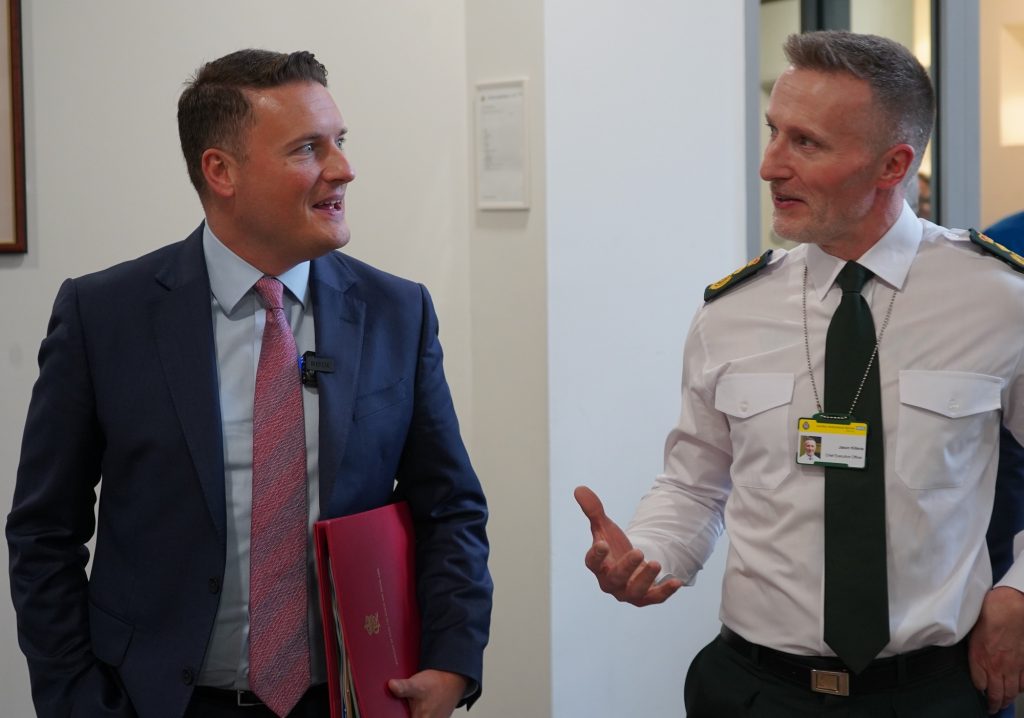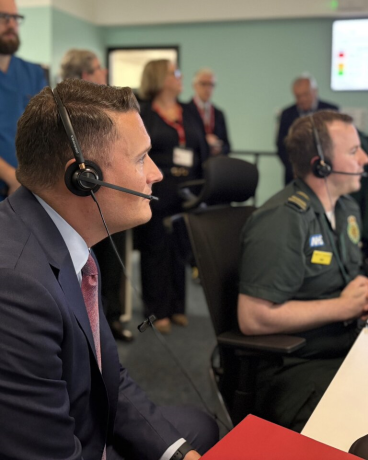Health Secretary visits London Ambulance Service to see how it is preparing for winter
Secretary of State for Health and Social Care, the Rt Hon Wes Streeting MP, visited London Ambulance Service this week (16 September) to hear how the Service is bolstering its preparations for winter.

London Ambulance Service recently achieved its fastest response times for many years as it continues to focus on improving performance. However, it has seen some challenging weeks with a spike in 999 calls as schools return and respiratory infections rise.
The Service has started its preparations for winter earlier than ever before by working with NHS partners in the capital to agree how they will cope with the increased demand seen each year.
London Ambulance Service will use AI to free up clinicians’ time for patients, increase the number of staff in its control rooms, put more ambulances on the road and increase the number of clinicians who can treat patients over the phone so they don’t have to go to hospital unnecessarily.
LAS has also agreed processes with London’s hospitals to ensure the care of patients is handed to Emergency Departments as quickly as possible so ambulances can get back out on the road and to people still waiting for help.
Health and Social Care Secretary Wes Streeting said: “I saw first-hand how hard London Ambulance Service staff are working to provide emergency care for patients as we prepare for winter. This year, we’re ramping up preparations and doing more to protect the country.
“From ‘war game’ exercises to extra checks for the most vulnerable, we’re making sure the health service is ready for whatever comes its way.
“But the public can play a crucial role too. The single best way you can protect yourself, your family, and the NHS is by getting vaccinated. It takes pressure off hardworking staff and helps ensure care is there for patients when they need it most.
“By preparing together – government, NHS staff and the public – we can give the health service the best chance to weather the winter ahead.”
The Secretary of State was greeted by LAS Chairman Andy Trotter and Chief Executive Jason Killens, before meeting Chief Medical Officer Dr Fenella Wrigley and Director of 999 Operations Stuart Crichton, who introduced him to crews in the Tactical Operations Centre and observed how they treat the most seriously ill patients in the capital.

He then shadowed our clinicians to watch how they are trailing a new Artificial Intelligence tool that allows them to care for hundreds of extra patients a day.
The AI technology listens to and digitally transcribes conversations between clinicians and patients and automatically transforms the spoken words into structured medical notes.
Jason Killens KAM, Chief Executive for London Ambulance Service, said: “I was delighted to welcome the Secretary of State to the Service and show him how hard our colleagues have worked to ensure that we are ready to care for Londoners during what will be a very busy winter.
“Last year, we went into winter with the most detailed plan we have ever had, created in partnership across the NHS, and this year we began our preparations earlier than ever – collaborating across the NHS in London.”
Dr Fenella Wrigley, Chief Medical Officer at London Ambulance Service, added: “While we have made preparations, I would like to encourage the public to do the same. I would like to say to Londoners: look after yourselves, your families, friends and neighbours this winter.
“Infections and seasonal sickness will be on the rise nationally, so we encourage all those who are eligible to have their flu and COVID-19 vaccinations.
“Little actions can make a big difference so we would urge Londoners to stay warm, take your medications, and seek medical help if you need it, without ignoring your symptoms.”
If it’s urgent, but it’s not a serious medical emergency, please consider other options such as your GP, pharmacies or NHS 111 online.
NHS 111 online should be your first port of call if you’re unsure what to do or unsure whether to go to A&E. Accessing 111 online is quick and simple, but if you cannot access it, call 111 by phone.

Follow us on social media: